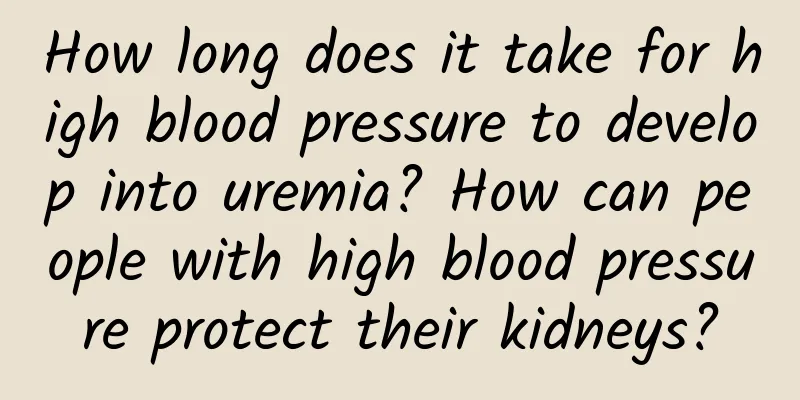How long does it take for high blood pressure to develop into uremia? How can people with high blood pressure protect their kidneys?

|
When Huazi was on night shift, a woman in her 50s anxiously asked where the hospital had wheelchairs. Huazi told her that during the day, she could ask the hospital guide to borrow a wheelchair for free, but at night, she could only scan the code and rent a shared wheelchair at the entrance of the hospital. The elder sister ran out in a hurry, and a moment later a pale, listless man in his 50s was pushed in a wheelchair. The elder sister said this was her husband, who had been nauseous, vomiting, and having diarrhea recently. Thinking he had eaten something bad, she bought some stomach medicine, but it didn't work. Because she was busy, she didn't go to the hospital. As a result, his condition suddenly worsened at night, he had no strength to walk, and he rarely responded when she talked to him, so she rushed to the hospital. 1. The diagnosis was uremia. When the doctor examined the patient, he saw the patient's swollen legs and the smell of urine in his breath. He had a rough idea that there might be something wrong with the patient's kidneys. Sure enough, the subsequent examination results proved the doctor's guess. The patient's blood pressure was 200/120mmHg, blood creatinine was over 1000, and he had severe anemia and acidosis. This patient was already uremic. The doctor told the patient's wife the diagnosis and that he needed to be hospitalized for treatment. Uremia patients can only rely on dialysis to maintain their lives, and if they want to be cured, they can only undergo a kidney transplant. The patient and his wife could not accept this result. How could a "healthy" person suddenly have uremia? Second, it was caused by high blood pressure. The doctor asked about the patient's blood pressure. The patient's wife said that her husband had high blood pressure for about ten years, but he did not feel any discomfort for more than ten years, so he did not receive treatment. The doctor told her that her husband's uremia was caused by high blood pressure. Uremia refers to renal failure syndrome, in which the kidneys cannot produce urine to excrete metabolic waste in the body, causing toxic substances to accumulate and poison. Hypertension is one of the causes of uremia. The continuous increase in blood pressure in the renal arterioles will cause inflammation, sclerosis, and stenosis of the blood vessel wall, leading to ischemia. This will in turn cause lesions in the glomeruli, tubules, and interstitium, and finally lead to glomerular sclerosis, tubular atrophy, basement membrane thickening, and interstitial fibrosis. The normal tissue of the kidneys continues to decrease, and renal function continues to decline, eventually leading to the occurrence of uremia. However, the human kidney has a strong compensatory capacity. As long as one-third of the kidney units can work normally, the physiological needs of the human body can be met. Therefore, when the kidney is damaged, as long as the total number of kidney unit damage does not exceed 70%, there may be no obvious symptoms and it is difficult to detect. When obvious symptoms appear, it means that the compensatory function of the kidney has been exhausted and most of the renal units have been destroyed. Once a renal unit is destroyed, it cannot be regenerated, so the function of the kidney can only go downhill and cannot be reversed. 3. How long does it take for high blood pressure to cause uremia? If high blood pressure is found but not controlled, it will cause kidney damage in about 3 to 5 years. However, due to the compensatory effect, there will be no symptoms when the degree of kidney damage is small. Usually, it will take 10 to 15 years, when the kidney damage reaches an extremely serious level, for symptoms to appear. The early symptom of kidney damage is increased nocturia, which means that the urine volume at night exceeds one-third of the daytime volume, or even reaches one-half, which indicates that the concentrating function of the renal tubules is impaired. Then the kidney filtration function becomes abnormal, protein appears in the urine, and it is manifested as long-lasting foam during urination. If it continues to progress, it will enter the uremia stage, causing damage to multiple systems such as digestion, respiration, circulation, bones, and nerves and muscles, and corresponding symptoms will appear. 4. How can patients with hypertension protect their kidneys? Controlling blood pressure within the normal range is the key to protecting the kidneys for patients with hypertension. Although the diagnosis of hypertension in China is limited to blood pressure exceeding 140/90 mmHg. However, in the latest hypertension guidelines, the normal range of blood pressure is defined as less than 130/85 mmHg. Therefore, people who receive antihypertensive treatment need to find a blood pressure reduction plan that suits them under the guidance of a doctor and try to control their blood pressure to the standard. During the treatment of hypertension, do not ignore the examination of renal function. Including blood creatinine, urea nitrogen, endogenous creatinine clearance, etc., it is recommended to check once every 3 to 6 months. And pay more attention to whether there are early manifestations of kidney damage such as increased nocturia, fatigue, loss of appetite, etc. Once related symptoms appear, seek medical attention in time. If kidney damage is confirmed, diet control should be carried out under the guidance of a doctor, and timely treatment should be carried out according to the treatment plan for uremia. In summary, people with high blood pressure should not ignore the damage to the kidneys caused by high blood pressure. Actively controlling blood pressure to meet the standard can avoid damage to kidney function. During antihypertensive treatment, attention should be paid to the detection of kidney function, and timely intervention should be made if problems are found. I am pharmacist Huazi, welcome to follow me and share more health knowledge. |
<<: Now is the best time to enjoy flowers, but why do some people always have itchy eyes?
Recommend
Why should diabetics test glycosylated hemoglobin?
Glycated hemoglobin (HbA1c) is an important indic...
[World Parkinson's Day] The appearance of these 10 symptoms may not mean you are old, but may be early signs of Parkinson's disease!
April 11th of each year is World Parkinson's ...
What are the symptoms of unsuccessful pregnancy preservation?
For various reasons, many women need to protect t...
What to do if you haven't given birth yet at 42 weeks of pregnancy
Since pregnancy is a major event for women, they ...
What's wrong with the uterus?
The uterus is a very important organ for women. T...
How to determine if pancreatic islet function is impaired
Diabetes is a common chronic disease, and its occ...
Not all women have this organ.
In people's traditional concept, a virgin sho...
What are the causes of hair loss in young women?
It turns out that hair loss is not a disease. Man...
Is the stomach an emotional organ? Why does stress cause stomach problems?
Produced by: Science Popularization China Author:...
How many days does a girl's menstrual period last?
The number of days a girl's menstrual period ...
How long does it usually take for lochia to be discharged?
Lochia will appear gradually after a pregnant wom...
The number of confirmed cases of this "young" virus has increased, and it likes to "take heavy measures" against children and the elderly. Learn about prevention methods quickly →
Respiratory diseases are more common in winter In...
Causes of missed menstruation
Women have more physical problems, which is proba...
The best way to eat papaya for breast enhancement is to eat it raw.
Everyone should know that papaya can enlarge brea...









